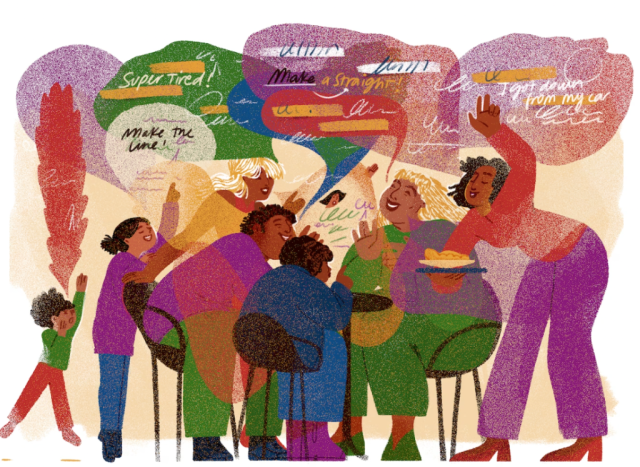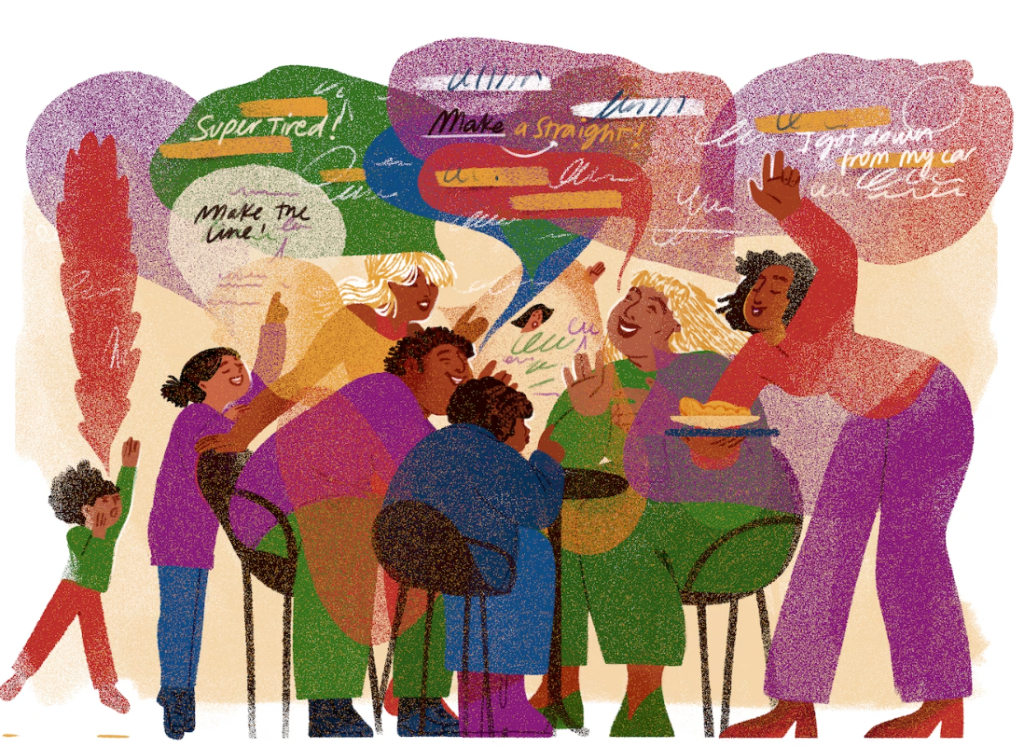

Add a unique English dialect to the many things this sunshine city is known for.
A report by Raquel Coronell Uribe for The Washington Post.
When Martha Valdés started traveling outside of her native Miami years ago, she noticed a pattern. In Nashville, in Las Vegas, in New York, when she uttered what she considered simple, common phrases, she would receive quizzical looks.
“I was like, what in the world? What are they hearing?” Valdés wondered. “I feel like I’m the normal one.”
What Valdés experienced hinted at something larger — an English dialect that has brewed over decades of Latino migration to Miami. New arrivals and their children have learned English through direct translations of Spanish phrases — and that has evolved into a distinct local dialect.
Now, thanks to a study published this spring, Miami — known for its beaches, basketball team, and stormy weather and politics — is getting recognition, and validation, for its unique use of the English language.
In Miami, people don’t “get” in line, they “make” the line (from the Spanish “hacer la fila”). They are not “very” tired, they are “super” tired (“Estar súper cansado”). They don’t “get out” of their cars, they “get down” from their cars (“Bajarse del carro”).
It’s a form of what experts call Miami English.
‘It’s super Miami’: Linguists identify new Floridian dialect
“Let’s make a party” and “thanks God” are just a couple of phrases that make up the new formally recognized dialect: Miami English. (Video: Drea Cornejo, Monica Rodman/The Washington Post)
Different American dialects — a way of using a language with vocabulary, grammar and pronunciation specific to a particular region or group — are popular throughout the country.
In New England, “wicked” is a substitute for “very.” Some New Yorkers say they stand “on” line rather than “in” line. In some Jewish communities, explaining something “on one foot” means to give an off-the-cuff answer, translating directly from the Hebrew “al regel achat” (or the Yiddish “af eyn fus”).
“There are many, many, many ways of speaking American English and many regional, ethnic and social dialects,” said Phillip M. Carter, a Florida International University professor and lead author of a paper on the Miami dialect published in the journal English World Wide in May. “And this is just another one being added to the tapestry.”
Miami culture is sometimes dismissed as “frivolous or unintellectual,” and that can seep into conversations about its dialect, Carter said. The stereotypes about Miami, however, do not make the dialect that has evolved over the years any less valid or grammatically complex than other dialects, according to Carter.
Carter’s study has gone viral on social media and has garnered attention from Miami locals and national audiences alike.
In one Instagram post, the popular “Only in Dade” account asks its followers “What’s a ‘Miami English’ phrase you say?” — and has collected more than 3,000 comments from Miamians sharing their favorite examples of the lingo.
In Miami English, one commenter noted, the restaurant server will know you want beef if you order a “meat” empanada. (“In Spanish, ‘carne’ can refer to both all meat, or specifically to beef,” Carter said.)
Another: Telling someone to make a right turn, is spoken as “Make a straight.” That’s a direct translation of “haga una derecha,” with derecha in Spanish meaning both to go straight or turn right.
The study has intrigued people because it is validating their experiences, Carter said.
“I think they’re interested in this because people are fed up of being told that the way that they speak is not real or not legitimate or not proper or not a part of the United States language scene,” he said.
Carter, originally from North Carolina, has spent the past decade researching the unique variety of English spoken in Miami.
The massive flight of Cubans to the city after the 1959 Cuban revolution, along with Latino immigrants from other countries, didn’t just change the city. It also changed the way its residents speak, he found.
Miami English is a nod to the city’s Spanish-speaking roots, part of the city’s role as one of the country’s biggest immigration hubs, said Harvard University lecturer Américo Mendoza-Mori, a lecturer in Latinx studies at Harvard University who completed his PhD at the University of Miami.
As the country grows increasingly diverse, Miami is a leader in the booming Latino population. According to data from the 2020 Census, nearly 7 in 10 people in Miami-Dade County are of Hispanic or Latino origin — the most populated county that had a Hispanic majority in the United States.
“Miami is probably the most diverse Spanish-speaking city, maybe in the world, just based on the number of different types of Spanish language varieties or dialects that are used here,” Carter said. The distinct Miami dialect draws on these Spanish dialects and expressions to create Miami English, he said.
Along with its own dialect, Miamians also have a unique accent, with its “long vowels” and specific idioms, that has been highlighted and lovingly spoofed by its speakers going back years. (Accent is a variation in the pronunciation of words.)
Miami English “borrows” Spanish idioms, which are then translated directly into English.
This phenomenon relies on what linguists call “calques” — borrowing phrases native from one language to another.
For example, “Sofía se casó con Rafael” would directly translate into “Sofía got married with Rafael” instead of the conventionally grammatical “Sofía got married to Rafael,” because in Spanish you get married with someone, not to someone.
People learning English for the first time often rely on these loans to acquire a new language. When these idioms are directly translated, however, they can sometimes sound off, or “ungrammatical,” to the ears of native English speakers.
Miami’s situation, however, is remarkable, Carter said. The use of calques has been passed down from immigrants to second- and third-generation Americans, meaning people who grew up speaking English as their first language at the same time as — or even before — they learned Spanish.
While his study focused on Cuban Americans and Cuban immigrants, Carter said his team has heard anecdotes of other Miami immigrant groups adopting the dialect, including those not of Latino descent.
This would make sense, Carter explains, because dialect is acquired primarily from one’s peers.
Martha Valdés is a second-generation Miamian. Her family immigrated from Cuba and then founded Valsan, a well-known local department store in South Florida.
Her small business, Martha of Miami, sells clothing with sayings and items specific to Miami.
“I feel like when you say that you’re from Miami, people automatically assume that you live by the beach, that you have a tan, that you spend all your day going down Ocean Drive,” Valdés said.
But to Miami Latinos, Valdés says, the reality is the greater Miami area and the Hispanic culture that comes with it.
“To us what Miami is, is going to any corner and there’s a Cuban bakery, anywhere you go,” she said. “Going to la ventanita and la ventanita being full of old viejos when they came to Miami in 1980 or 1960, pre-Fidel or after; the lady behind the counter kind of having a little bit of an attitude because she just came from Cuba — that’s Miami.”
Harvard’s Mendoza-Mori noted that companies based in Latin America often prefer to conduct business in Miami to avoid potential political or economic crises in their home countries.
That has made Miami the unofficial capital of Latino business development, which has made Spanish, and Spanish-based English dialects, a key component of the city’s economic engine.
Latin-influenced dialects that children speak, such as Miami English, have historically been discouraged by the U.S. education system. These dialects, however, are linguistically sophisticated, despite the stigma attached to them, Mendoza-Mori said, along with other dialects, such as African American Vernacular English.
The dialect’s recent identification in higher education recognizes the particularly interesting soup created by generations of Latino immigration, legitimizing Latino Miamians when other systems have failed to do so, he said.
Ricardo Brown, a Cuban American Miamian who hosts a Miami-based radio show on Actualidad Radio and has spent more than 40 years as an English- and Spanish-speaking journalist, said he has no doubt he speaks Miami English.
“I think I’ve picked up the Miami dialect, and I’m proud of it,” he said. He said he has noticed a “huge difference” in expression when he interviews Latinos from other U.S. cities. “And I think it’s a good thing, you know. We’re a multicultural country. I think it’s one of the things that’s great about the United States.”
Add a unique English dialect to the many things this sunshine city is known for. A report by Raquel Coronell Uribe for The Washington Post. When Martha Valdés started traveling outside of her native Miami years ago, she noticed a pattern. In Nashville, in Las Vegas, in New York, when she uttered what she considered simple,





